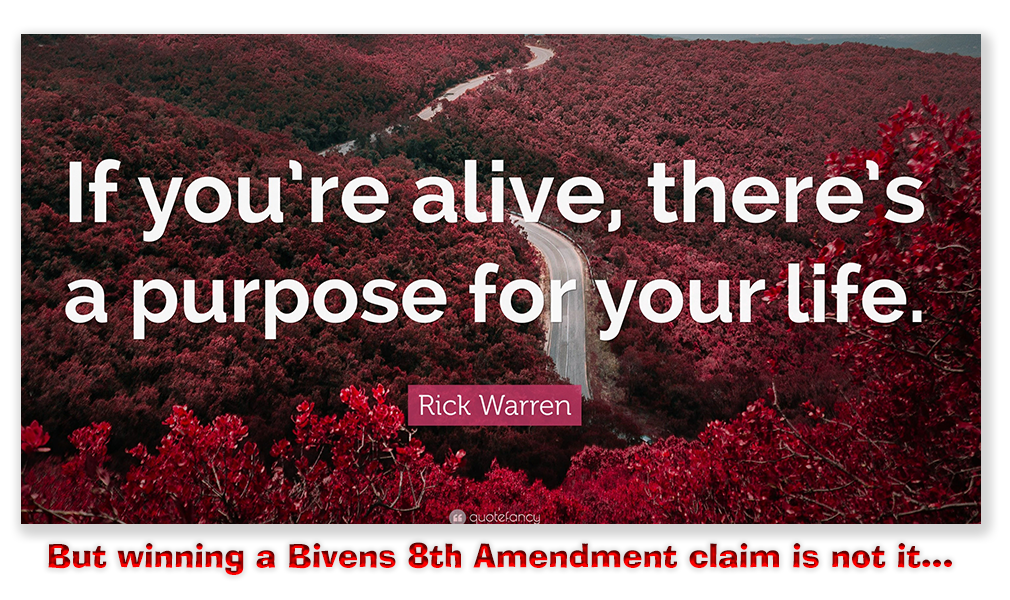We post news and comment on federal criminal justice issues, focused primarily on trial and post-conviction matters, legislative initiatives, and sentencing issues.

10TH CIRCUIT KILLS BIVENS ‘DELIBERATE INDIFFERENCE’ CLAIM
The 10th Circuit minced no words: “The Supreme Court’s “abrogative process of Bivens has been ‘gradual, but relentless, such that the “‘right answer’ to whether to recognize a Bivens cause of action will always be no… Bivens is now all but dead.”
 Dustin Rowland’s lawsuit was pretty plain vanilla. He sued various BOP officials, claiming they were deliberately indifferent to his serious medical needs by repeatedly denying his requests for hernia surgery and post-operative treatment, seeking damages under Bivens v. Six Unknown Named Agents of the Federal Bureau of Narcotics. It is the kind of medical indifference suit that inmates file across the country all the time.
Dustin Rowland’s lawsuit was pretty plain vanilla. He sued various BOP officials, claiming they were deliberately indifferent to his serious medical needs by repeatedly denying his requests for hernia surgery and post-operative treatment, seeking damages under Bivens v. Six Unknown Named Agents of the Federal Bureau of Narcotics. It is the kind of medical indifference suit that inmates file across the country all the time.
Or used to.
On November 19th, the 10th Circuit held that under the 2022 Supreme Court decision in Egbert v Boule, John’s case presented an application of Bivens that was different from the situations recognized as raising a valid Bivens claim. Given the “expressed caution about extending the Bivens remedy, even significant parallels to one of the Court’s previous Bivens cases” may not be enough to show that a case arises in the same context,” the 10th said Dustin could not seek damages for any 8th Amendment violations he had suffered.
Dustin’s case was materially different from the one prior case that SCOTUS – back in its salad days – had held raised a valid Bivens claim. In the decision in Carlson v. Green, the record showed that the inmate victim had died because of deliberate indifference. “Small differences can easily satisfy the new-context inquiry,” the 10th said.
He was dead, Dustin. You’re not. Viva la difference.
 The 10th’s holding drives a stake through virtually any Circuit Bivens 8th Amendment claim and probably will embolden the Government (like it needs any such encouragement to stretch precedent enough to deny an aggrieved prisoner a remedy for legitimate constitutional claims) to make similar arguments in other Circuits. If any circuit split results, the Supremes would settle it (and probably not in favor of the prisoner).
The 10th’s holding drives a stake through virtually any Circuit Bivens 8th Amendment claim and probably will embolden the Government (like it needs any such encouragement to stretch precedent enough to deny an aggrieved prisoner a remedy for legitimate constitutional claims) to make similar arguments in other Circuits. If any circuit split results, the Supremes would settle it (and probably not in favor of the prisoner).
Rowland v. Matevousian, Case No. 23-1343, 2024 U.S.App. LEXIS 29406 (10th Cir., November 19, 2024)
Bivens v. Six Unknown Named Agents of the Federal Bureau of Narcotics, 403 US 388 (1971)
Egbert v. Boule, 596 U.S. 482 (2022)
Carlson v. Green, 446 U.S. 14 (1980)
– Thomas L. Root



